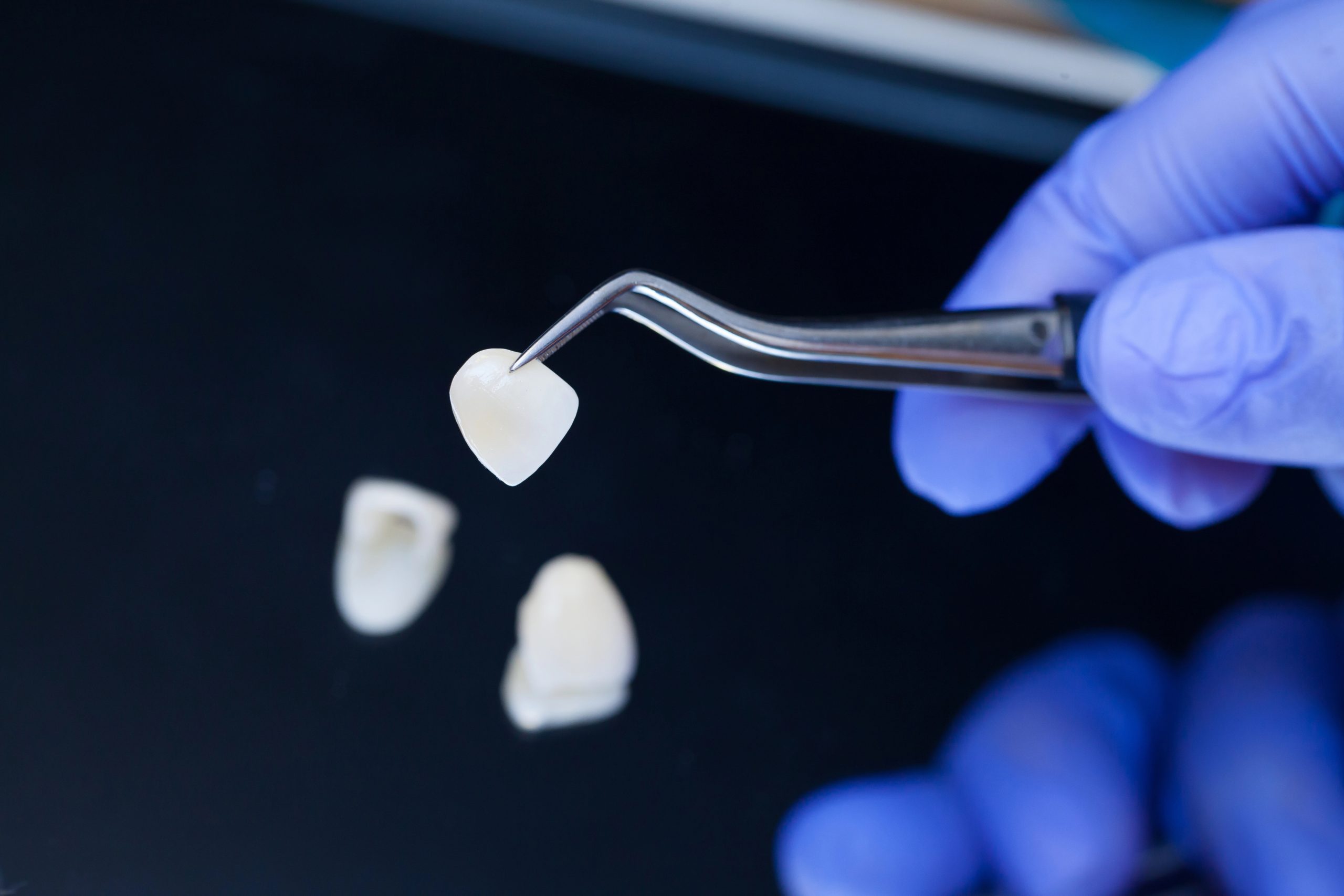What are dental crowns?
Teeth suffering from damage and decay can be protected and restored with dental crowns. A dental crown can cover, or cap, a severely damaged tooth that can’t be treated with a filling. In addition, teeth that have been treated with root canal therapy can be sealed with a crown. Sometimes, dental crowns are used for smile makeovers or other cosmetic treatments.


The dental crown treatment process
Permanent Crown Placement
After the final adjustments are made, your dentist will permanently affix the crown into place. A powerful dental cement will be applied, restoring your smile and bite.
Fit Inspection & Adjustments
Once your crown is created, you’ll return to the office for fitting and adjustments. Your Greensboro dentist will take the time to ensure the crown is fully secured to your tooth and comfortable in your mouth.
Temporary Crown Placement
Since your crown won’t be ready for a few weeks, your dentist will attach a temporary resin cap. This will protect your newly-trimmed tooth until your permanent crown can be placed.
Manufacturing
After your dentist collects all of the data, the information will be sent to a dental lab. Here, your crown will be built from durable porcelain ceramic. Although this process takes a few weeks, lab-made crowns are known as the most long-lasting and comfortable dental crown option.
Images & Color Matching
Several images of your teeth will be captured in addition to your impressions or scans. These pictures will ensure that your new crown perfectly matches the exact shade of your existing teeth. This color-matching process allows your porcelain crown to look just like a natural tooth.
Impressions or Scans
After the dentist has trimmed and prepared your tooth for a crown, they will administer an impression. Dental putty and trays or a 3D scanner will capture your teeth impressions, which will then be used to build your permanent crown.

Types of dental crowns
in Greensboro, NC
Lab-made crowns are crafted in dental labs that specifically specialize in dental appliances and prostheses.
Your dentist in Greensboro, NC will take impressions, scans, and photos of your teeth, which will be sent directly to the lab. At the lab, experienced technicians will use an advanced manufacturing process to build the crown with durable ceramic and metal materials. Once the crown is complete, it will be shipped back to your dentist for the final fitting and placement.
Lab-made crowns seamlessly blend into your smile and are known to feel just as natural as a real tooth. In addition, they are usually the most long-lasting and durable type of crown.
Think you may need
a dental crown?
What issues can a dental crown treat?
Teeth that suffer from damage and decay can be protected and restored with dental crowns. Patients with serious cavities, cracked teeth from dental trauma, or broken teeth from accidents and injuries can be dental crown candidates. Crowns create a cap over the entire tooth structure and protect it from further complications. In addition, crowns can restore the shape, appearance, and function of damaged teeth.
Dental crowns can also be used for cosmetic cases if treatments such as veneers and dental bonding are not appropriate. After a root canal, dental crowns are applied to cover and protect teeth after treatment.
How do I know if I need a dental crown?
You may be a candidate for a dental crown if you have damaged or severely decayed teeth. Schedule an appointment with your dentist if your teeth are causing pain, discomfort, or are visibly damaged or discolored. Depending on the cause of your dental issues, your dentist may suggest a dental crown or another restorative treatment. Call our Greensboro dental office today.
How long do dental crowns last?
Dental crowns last up to 15 years when carefully made and properly placed. Maintaining strong oral health habits such as brushing twice per day, flossing once per day, and seeing your dentist every 6 months can enhance your crown’s longevity. Same-day crowns can be slightly less durable, but they can still last several years with proper care.
How do I care for my dental crown?
Treat your dental crown just as you would with a natural tooth. Be sure to brush twice a day for at least two minutes, ensuring that the full surface of every tooth is polished. Floss at least once per day for a few minutes, preferably at night. Make sure to floss against the tooth and below the gum line. Visit your dentist every six months for a check-up to make sure that your crown and surrounding teeth are in good health.
Are dental crowns covered by insurance?
Dental crowns that are required for restorative purposes are typically covered by insurance. The exact amount of coverage you receive will depend on the deductible and yearly limits of your policy.
If you are receiving a crown for cosmetic purposes, the treatment may not be covered by insurance. Consult with your insurer to make sure your procedure is covered.
How Long Does It Take to Recover From Crown Treatment?
The crown procedure involves filing down and shaping your teeth before bonding a crown. While the procedure is performed under local anesthesia and is painless, once the anesthetic wears off, you may feel some tenderness, sensitivity, and irritation. This may last for a few days but should be mild enough to respond to mild pain medication.
Rinse your mouth with saline solutions a few times a day to reduce inflammation. If your teeth are feeling sensitive, avoid hot and cold foods and drinks, brush your teeth with toothpaste for sensitive teeth, and apply a desensitizing gel.
If pain continues, we recommend anti-inflammatory pain medication such as ibuprofen. Though you can eat what you want after the crown procedure, avoiding hard, chewy, and sticky foods may help reduce discomfort.
You can also chew on the opposite side of the mouth for the first few days and wait a couple of days before flossing around this crown. Your gums may also feel some slight irritation or sensitivity when exposed to dental cement. However, this discomfort should not last for weeks. If you notice the discomfort is prolonged or severe, contact Dr. Jah right away.
How Common Is Decay Under a Crown?
Developing tooth decay under a dental crown is common in patients who do not practice good oral hygiene. While your tooth is covered on all sides by a durable and strong material that protects your tooth from damage, this won’t prevent you from developing tooth decay and gum disease if you fail to properly brush and floss.
Decay forms when plaque accumulates around the gum line and is introduced to the underlying tooth where the tooth and crown meet. If left untreated, the cavity will spread and get bigger, putting the deeper layers of the tooth at risk.
When it reaches the dental pulp, you are at risk of infection. This is why practicing good oral hygiene and attending regular dental checkups are so important. A dentist can examine your crowns to check on their condition and take x-rays to look for signs of underlying tooth decay.
What Are Potential Signs That My Crown Might Be Failing?
While dental crowns are highly successful at protecting damaged and vulnerable teeth from breakage, sometimes they can become damaged, don’t fit properly, become loose, cause an allergic reaction, or develop oral health problems underneath them. Watch out for the following signs of crown failure:
- Your crowns are loose
- Your crown has fallen off
- You feel significant pain and sensitivity when biting down
- There are gaps between your crown and other teeth
- A dark line is forming around the gum line of the crown
- Your bite feels “off”
These symptoms are signs of a failing crown or issues that can cause a failing crown, including tooth decay, damage, metal allergies, and improper placement. If you think your crown is failing, contact us at Evergreen Dental Co. today to schedule a consultation with Dr. Tariq Jah.


